It is not new to see many countries beefing up efforts to move toward a cashless society. Look at China as an example – far from limiting itself to fancy shopping malls or big chain stores the use of mobile phones as a payment method is nearly ubiquitous there. Restaurants, bookstores, coffee shops, and even traditional street markets or street vendors accept mobile payment there.
Similar examples can be found in many places around the world these days, but it might be surprising to hear that one of them is North Korea, the most isolated country in the world.
According to a Seoul-based online newspaper Daily NK, some North Korean people are apparently using mobile phone credits as currency and a means of commercial transaction.
Users of North Korean wireless telecommunications provider Koryolink can enjoy 200 minutes of phone calls per month by paying 2,850 North Korean won every quarter, an unnamed source based in North Korea’s South Pyongan province told the publication.
Interestingly, according to this source, such credits are exchangeable, and an increasing number of people are using this as a means of payment, or cash equivalent.
Here is how it works. To send credits to others, users type in the first three digits of the sender’s number and the phone number of a receiver. Then users can send credits using SMS messages.
Some people use this method to transfer money to remote areas, while in some regions such as North Hamgyong province, people use this to pay for goods at street markets, locally known as Jangmadang.
Since sources quoted by Daily NK are based in only a couple of provinces, it is unclear if this method is widely used across North Korea and premature to say it is a rising trend.
However, this story does spark interesting comparisons to the ways mobile payments have transformed other countries’ economies. Take, for example, success of mobile money in Kenya, which is considered one of the frontrunners on the road to being a cashless society.
The story began with the 2007 launch of M-Pesa, a virtual banking system that provides transaction services through a SIM card. Once the SIM card has been inserted into a mobile device, users can make payments and transfer money to vendors and others using SMS messages.
M-Pesa was originally introduced in Kenya as an alternative way for the unbanked population of the country to have access to financial services, and the result was remarkable. Since people no longer need to carry cash around, occurrences of theft, robbery, and fraud were reduced. The efficiency of financial services has also improved as people do not need to visit banks, queue up, and wait anymore.
There are numerous reports showing how M-Pesa improved the standard of living in Kenya.
A similar idea for North Korea was discussed and shared at one of the latest seminars held by South Korea’s Korea Institute of Finance. At the seminar held in December 2018, vice head of IBK Economic Institute Cho Bong-hyun pointed out the necessity of North Korea using M-Pesa as a model.
“The number of mobile phone subscribers in North Korea has reached about 6 million. Smartphones were also first launched in 2013, and there are as many as 20 smartphone products made domestically,” said Cho.
He added, however, that the payment infrastructure is still poor although there is a rising trend of mobile phones.
Cho suggested a step-by-step approach to improving such infrastructure. The first step would be to install ATMs at airports, train stations, shops, and buildings in key locations, enabling people to pay bills easily. He estimated about 20,000 ATMs would be needed initially.
The second step would be to launch mobile applications that tie to banks and the third stage suggested by Cho is to introduce a similar system to M-Pesa.
Cho noted that such steps will lay the grounds for North Korea to build a more comprehensive financial infrastructure. This is why Daily NK’s report about a burgeoning, if informal, system of cashless payments is worth paying close attention to.

































